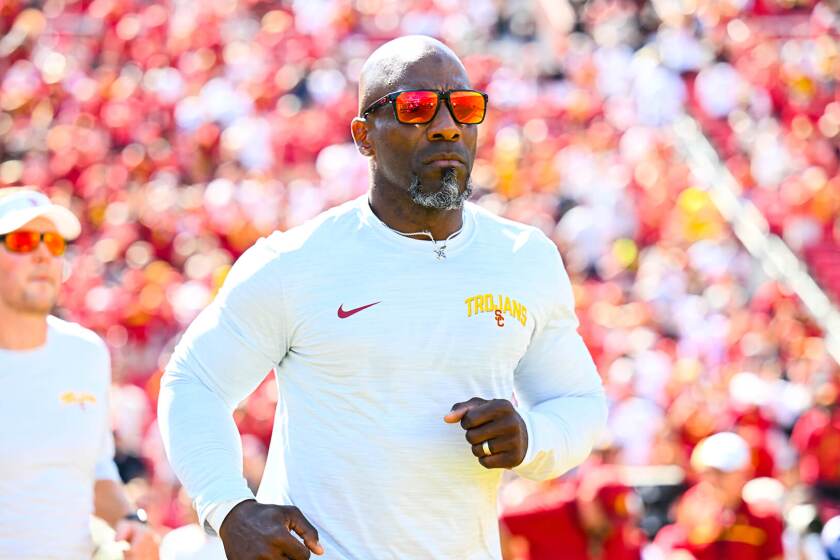Perry Doesn’t Give Up
- Share via
On the night of Feb. 7, 1995, George Perry Jr., alone in his bed at his San Bernardino home, put a handgun to his head and pulled the trigger.
That bullet not only took a man’s life, it shattered a family.
Today, Perry’s son, George Perry III, continues his USC football career, but he has not forgiven his father.
His mother has moved to Frederick, Md., where her younger son, Jeff, is now a high school senior and a major college football prospect.
Perry, a junior defensive end, had the best game of his Trojan career last Saturday against Arizona. Coach John Robinson termed his effort “a great leap forward in his career.”
Perry talked about that this week, but he also talked about the pain left by his father’s suicide.
“It was a cowardly thing to do and I’ll never forgive him for it,” he said, repeating what he had said a year ago.
“Just giving up like that, that’s unacceptable to me.”
Perry’s parents were separated at the time of his father’s death and the player said his father talked often of his pain.
“He would tell me every time we were together how bad he felt about his relationship with my mom, about the separation, but he never gave me an indication that he was considering taking his life,” he said.
“The thing I’ll always remember about him is how he hated lying, how upset he’d get if my brother or I told a lie. Well, to be thinking about taking your life and to not say anything about it to your family, that’s the biggest lie of all.
“It was his way out of a problem. Why didn’t he talk to me? I feel it was a vengeful act, that he did it to hurt my mom.”
Once, they were together, attending Perry’s games at San Bernardino High. Now it’s a family seared by death, on opposite edges of a continent.
“The best part of high school football for me was to look in the stands and see my parents there,” Perry said. “They would even be waiting for me outside the locker room afterward.”
Now, he toils alone, although he said his mother plans to be at the Notre Dame-USC game Nov. 30 at the Coliseum.
Being without family doesn’t seem to have negatively affected Perry’s game. He came to USC as a defensive tackle, and played as a backup nose guard and defensive end his first two seasons. He made the permanent switch to defensive end last spring.
It’s his natural position, defensive coordinator Keith Burns said.
“He’s got the body type that’s exactly what you look for in a defensive end--tall, long arms, strong and fast,” he said.
“He’s still learning pass rush technique, but one of his great assets is his attitude. He comes to practice every day with the idea of getting better.
“That game he had Saturday, we’ve seen flashes of that from him. But he did it all afternoon Saturday. He was throwing off blockers, not letting himself get engulfed.
“Now, he sees himself as a starter and he’s more confident in himself than he ever was before.”
Against Arizona, Perry had five tackles, two for losses and another for an eight-yard sack. He had a primary assignment: Keep an eye on Arizona’s Keith Smith, perhaps the nation’s fastest quarterback.
“We wanted George to make sure Smith never got outside of him, that when he started running, we wanted him going up the middle. He did it perfectly. The two long runs he got [22 and 42 yards] were up the middle.”
One thing Perry wants to learn is how to retain weight. He reported to camp last August at 278 pounds but has dropped to 245, small for a defensive end.
“Last year when I was a nose guard, I was sometimes getting double-teamed by two 300-pound guys,” he said. “That can wear you out in a hurry.”
USC’s defense leads the Pac-10 statistically, but Perry believes the only number that matters is 1--as in Jan. 1, and what bowl you’re in.
“We are the best defense in the conference, but we won’t prove it until we get into the Rose Bowl,” he said. “Stats are nice, but they don’t mean a thing unless we get back to the Rose Bowl.”
More to Read
Go beyond the scoreboard
Get the latest on L.A.'s teams in the daily Sports Report newsletter.
You may occasionally receive promotional content from the Los Angeles Times.





